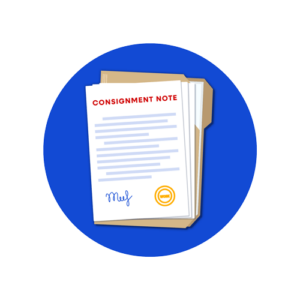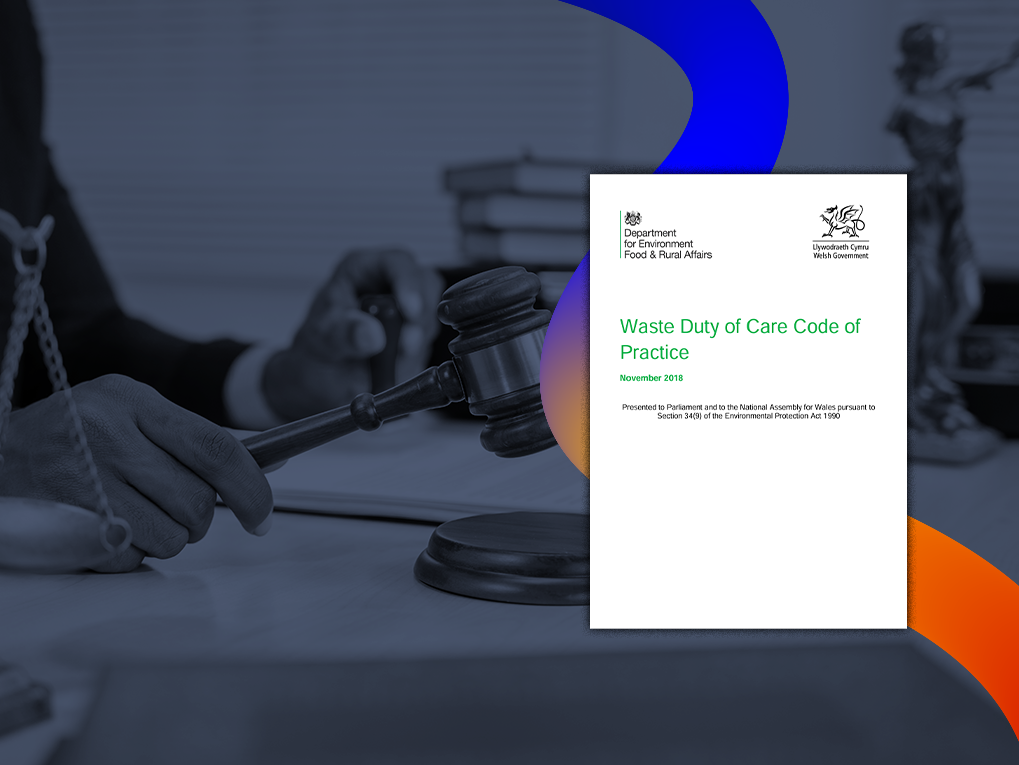Whose problem is it when your waste leaves your premises? Funnily enough (or perhaps not), it’s still yours…
If your business produces hazardous waste, you have legal responsibilities that go beyond simply arranging for someone to collect it. This falls under your Waste Duty of Care – a legal requirement that applies to every business handling waste in the UK.
But what exactly is a Duty of Care? What does it mean in practical terms? How can you make sure your business is doing the right thing? Read on to see your Waste Duty of Care explained as we remove the guesswork.
- What Is the Waste Duty of Care?
- Who Does the Waste Duty of Care Apply To?
- How Does the Waste Duty of Care Work?
- How Long Does Your Waste Duty of Care Last?
- What Is a Waste Duty of Care Audit?
- Ensure Duty of Care with Reliable Waste Support
 What Is the Waste Duty of Care
What Is the Waste Duty of Care
The Waste Duty of Care is a legal obligation requiring anyone who produces, carries, keeps, treats or disposes of waste to take all reasonable steps to ensure their waste is managed safely and legally from production through to final disposal. It means you’re responsible for your waste from the moment it’s produced until it’s dealt with. That responsibility doesn’t even end when the waste leaves your site – if something goes wrong further down the line and your business didn’t follow the proper process, you could still be held accountable.
This legal obligation is set out in Section 34 of the Environmental Protection Act 1990 – a fact that, if remembered, sounds either very impressive or super nerdy, depending on the company you keep…
The idea behind the Waste Duty of Care is to prevent waste from being mismanaged and causing harm to the environment or public health.
The Waste Duty of Care Code of Practice
The Waste Duty of Care Code of Practice provides further practical guidance for complying with the law. This code, issued by the Department for Environment, Food & Rural Affairs (DEFRA), is admissible in court and offers clear steps to ensure waste is managed the right way.
Why Is It Important?
To begin with, there’s the ethical side of things – hazardous waste can pose serious risks to people, wildlife, ecosystems and the environment. Managing waste properly isn’t just about ticking boxes – it’s about doing the right thing morally. This alone should be enough, but we’ve seen enough fly-tipping and illegal waste disposal to know it isn’t.
Failing to meet your Duty of Care can have serious consequences, such as hefty fines (there’s no upper limit on the courts’ power to fine), legal action, and lasting damage to your business’s reputation.

Who Does the Waste Duty of Care Apply To?
Do you come into contact with waste as part of your day-to-day? Chances are, the Duty of Care applies to you, even if you only produce small amounts of waste.
Duty of Care waste legislation in the UK applies to anyone who:
- Produces waste – all business types, including private sector businesses such as manufacturers, labs, construction firms, and public sector services like schools, medical facilities and prisons. Waste producers are the best-suited people in the waste journey to identify and classify the waste.
- Carries or transports waste – any person who regularly collects, carries or transports waste as part of day-to-day business or as a profitable endeavour (including your own waste).
- Deals in or brokers waste on behalf of others – anyone who buys waste (yes, it’s a thing!) with the intention of selling it on, even if they don’t take physical possession of the waste themselves. This also includes those who arrange waste management and transportation on behalf of others.
- Stores or treats waste on-site – this could cover those producing waste in the first place, right through to whoever is responsible for its final disposal.
If you fall into one of the above categories, you are what the Waste Duty of Care Code refers to as a ‘waste holder’.
How Does Waste Duty of Care Work?
There are a few essential steps for a hazardous waste producer to understand as part of the Duty of Care requirements:
 #1 Classify Your Waste Correctly
#1 Classify Your Waste Correctly
You must accurately identify and label hazardous waste using the correct hazard property codes and descriptions. This helps ensure the waste is handled safely and legally throughout the full journey. Unsure of your waste? A mobile chemist will be able to help you identify, classify, label and pack your waste if needed.
 #2 Store Your Waste Safely
#2 Store Your Waste Safely
Hazardous waste must be stored securely in UN-approved containers that are appropriate for the type of waste. The containers need to be clearly labelled and stored in a way that prevents leaks or spills.
#3 Only Use Licensed Waste Carriers

You must only hand over hazardous waste to a carrier who is licensed to transport it – this means doing our due diligence and checking their waste carrier registration. There are plenty of cases of companies prosecuted for handing hazardous waste over to unlicensed operators who went on to dump it illegally.
#4 Understand Waste Transfer and Consignment Notes

A waste transfer note must accompany every movement of non-hazardous waste. For hazardous waste, a hazardous waste consignment note is used for tracking the waste movement. These documents prove that waste has been transported legally and responsibly.
#5 Keep Records

You need to keep copies of all of your waste transfer and hazardous waste consignment notes, as well as any other relevant documents. This help prove that you’ve met your obligations, should any questions arise or a Waste Duty of Care Audit be needed.
How Long Does Your Waste Duty of Care Last?
Gone are the days of throwing something away and never giving it a second thought… Your Duty of Care doesn’t even end when waste leaves your premises. It continues until the waste has reached its final, legal destination – whether that’s a recycling facility, a treatment plant, or a licensed disposal site.
To meet your ongoing responsibility, you’re expected to take reasonable steps to make sure your waste isn’t mishandled at any stage of the journey. This isn’t just good business practice – it’s your legal obligation under the Waste Duty of Care Code of Practice.
Failing to follow the requirements can expose yourself and your business to criminal prosecution, fines, and reputational damage – even if you use a broker or dealer, you still share responsibility for what happens to your waste.
In short, your duty of care continues until the waste is fully recovered or disposed of – not just until it’s collected.
In terms of how long you should keep waste transfer notes and hazardous waste consignment notes – whether electronic or paper:
- Two years for non-hazardous waste
- Three years for hazardous waste
What Is a Waste Duty of Care Audit?
A Waste Duty of Care audit is a review of your business’s waste management practices to ensure you’re fully compliant with legislation. It typically looks at:
- Waste classification procedures
- On-site storage methods
- Paperwork (including transfer and consignment notes)
- Whether your waste contractors are properly licensed
Carrying out regular audits can help you spot gaps, find opportunities and stay audit-ready ahead of any surprise inspections.
Want help conducting a Waste Duty of Care audit? Get in touch, we’ll be happy to help!
 Ensure Duty of Care with Reliable Waste Support
Ensure Duty of Care with Reliable Waste Support
It’s one thing to understand your Duty of Care. Putting it into practice every day is another, especially amongst the stresses and trials of running a business.
That’s where Hazport comes in. We work with businesses across the UK to make hazardous waste compliance simple.
We can help you:
- Identify and classify your waste correctly
- Store it safely and securely on site
- Complete the correct paperwork, every time
- Use fully licensed transport and disposal partners
- Keep track of your documentation in one place
- Conduct Duty of Care audits to ensure full compliance
Our team of hazardous waste experts are here to support you at every step of the waste journey, so you can focus on running your businesses whilst we handle the hazardous waste side of things.
Contact us today to learn more about our hazardous waste disposal services and how we can help you create a safer and more compliant waste management system for your facility.





